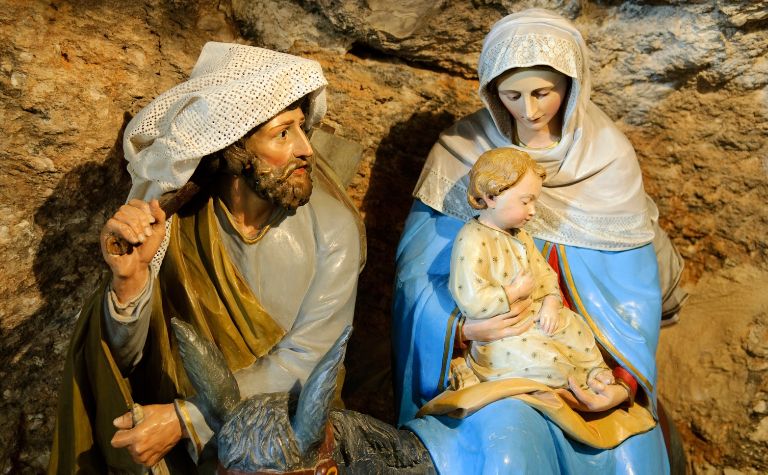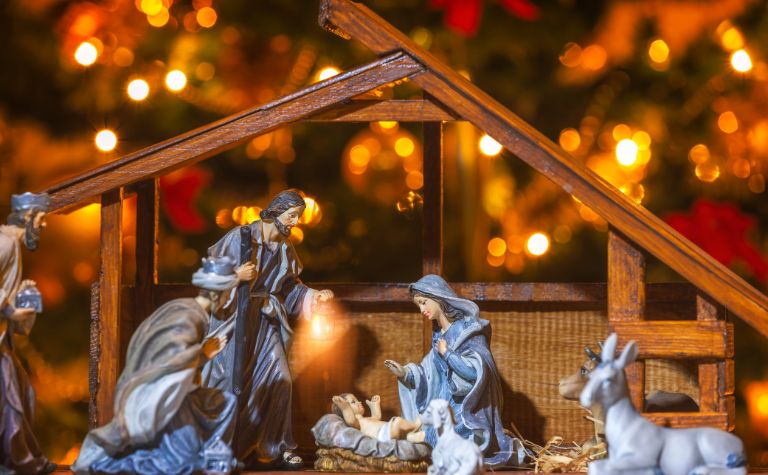The story of Mary’s unique conception has been a cornerstone in Christian narratives for centuries.
Serving as both a symbol of faith and a testament to divine intervention, the tale of how Mary became pregnant with Jesus carries profound implications.
This article delves into the traditional biblical account, shedding light on the events, characters, and theological interpretations surrounding this remarkable event.
Through understanding this narrative, one gains deeper insights into the very foundation of Christian beliefs and the historical contexts that shaped them.

The Annunciation: The Angel Gabriel’s Message
In the small town of Nazareth, a young woman named Mary received a visit that would forever change her life and the course of history.
The Angel Gabriel appeared to her with a message from God.
Though initially startled by this celestial appearance, Mary listened as the angel told her she would conceive a child by the Holy Spirit and this child would be called the Son of God.
Such an announcement was overwhelming, to say the least, but Mary’s response showcased her deep trust and commitment.
She replied, “Behold, I am the handmaid of the Lord. May it be done to me according to your word.”
The Doctrine of the Virgin Birth
The term “virgin birth” refers to the belief that Mary became pregnant not through natural means but through the power of the Holy Spirit.
This belief is supported by several passages in the New Testament.
For instance, the Gospel of Luke states, “The Holy Spirit will come upon you, and the power of the Most High will overshadow you.”
It’s important to differentiate between the “virgin birth” and the “Immaculate Conception.”
While the former concerns Jesus’s conception, the latter is about Mary being conceived without original sin, ensuring a pure vessel for the birth of Jesus.

Joseph’s Role and Reaction
Joseph, Mary’s betrothed, faced a moral and emotional quandary when he discovered she was pregnant.
With the intention of quietly ending their betrothal, his plans were interrupted by a divine message.
In a dream, an angel reassured him about Mary’s pregnancy, emphasizing its divine origin.
The angel instructed Joseph to take Mary as his wife and to name the unborn child Jesus.
Joseph stood by Mary, demonstrating admirable character, providing protection and support as they navigated the unfolding events together.
Significance of the Virgin Birth in Christian Theology
For Christians, the virgin birth holds deep theological meaning.
It underscores Jesus’s unique nature, being both fully human, born of a woman, and fully divine, conceived by the Holy Spirit.
This dual nature becomes foundational to many Christian doctrines, including Jesus’s ability to bridge the gap between humanity and God.
Furthermore, prophecies in the Old Testament, such as Isaiah’s prediction that “a virgin shall conceive and bear a son,” find their fulfillment in Jesus’s birth.
This connection between Old and New Testaments reinforces the narrative of a planned and purposeful salvation story.
Moreover, Jesus being born without inheriting the original sin has implications for Christian beliefs about sin and salvation. His sinless nature is essential for his role as the perfect sacrifice for humanity’s sins.

Contemporary Perspectives and Debates
Over time, the concept of the virgin birth has sparked numerous discussions.
Scholars and theologians have debated its interpretation and the extent to which it should be taken literally or symbolically.
Modern scientific understandings of conception have also contributed to these discussions.
Yet, despite varying opinions, the virgin birth remains a cornerstone belief for many Christian denominations.
For believers, it is not simply about the biological intricacies but more about the profound message of God’s intervention in human history.
Historical and Cultural Context
Understanding the context of Mary’s time provides additional insight into the significance of her pregnancy.
During the first century, Israel was marked by strict societal norms and religious practices.
Lineage was of utmost importance, ensuring one’s place in society and their connection to the broader community.
Given this backdrop, Mary’s unexpected pregnancy, outside of wedlock, would have been a source of scandal.
This makes the divine reassurances to Mary and Joseph and their willingness to face potential societal backlash even more poignant.
Their actions and the subsequent events become a testament to the overriding importance of God’s plan over societal expectations.
Mary’s Influence on Art and Culture
Across the centuries, the narrative of Mary’s miraculous conception has left an indelible mark on global art and culture.
Inspired by the story, artists from various backgrounds have produced countless masterpieces depicting the Annunciation, Mary’s serene acceptance, and the awe-inspiring moments surrounding Jesus’s birth.
Renaissance painters, for example, frequently chose the Annunciation as their subject, portraying the celestial encounter between Mary and the Angel Gabriel in intricate detail.
These artworks often emphasized Mary’s purity and humility, capturing the pivotal moment when she learns of her role in a grand divine plan.
Moreover, literature and music have also been significantly influenced. Songs like “Ave Maria,” regardless of its numerous versions, remain iconic, echoing the sentiments and reverence associated with Mary.
Plays, poems, and novels across different languages and cultures have explored the myriad emotions and challenges Mary might have faced.
The story’s influence extends to architecture too.
Many cathedrals and churches dedicated to Mary showcase impressive designs, mosaics, and stained-glass windows depicting scenes from her life.
Through these varied artistic expressions, the tale of Mary’s conception transcends time and geography, inspiring and resonating with people worldwide.
Conclusion
The story of how Mary became pregnant with Jesus is one of wonder, challenges, and profound significance.
As told in the biblical accounts, it paints a picture of trust, divine intervention, and the beginning of a story that would influence countless generations.
Whether seen through theological, historical, or personal lenses, the virgin birth stands as a central event in the tapestry of Christian thought and celebration.
Related Questions
Joseph, the husband of Mary and the earthly father of Jesus Christ, is depicted in the Gospels as humble, law-abiding, and obedient. In many Christmas scenes, such as in displays of the manger, he is...
The virgin Mary, the mother of Jesus, is one of the most fascinating people in the Bible. For 2,000 years, people of different eras and cultures have marveled at her faith in God. Mary's story in the...
